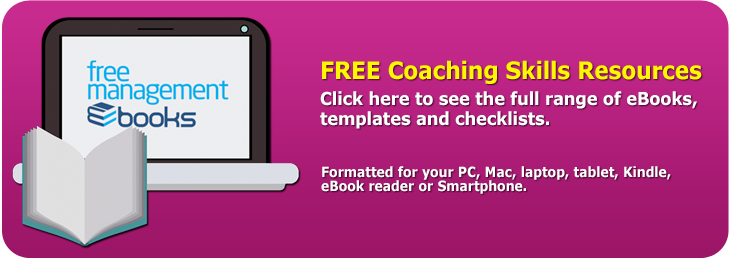Demonstrating Empathy and Using Intuition in Coaching
Empathy begins with awareness of another person's feelings and develops naturally out of active listening. It will have an impact on the level of rapport you are able to create. Obviously, it would be easier to be aware of the coachee's emotions if they simply tell you how they felt.
However, unless you are dealing with someone who is unusually candid you will need to interpret non-verbal cues. You also need to pay attention to the precise language they are using in response to your questions or during the communication.
Your role as coach is to determine how the coachee feels and the strength of this feeling. You can show empathy by acknowledging their emotions, whether they are positive or negative.
For example:
'I can see why that upset you.'
'I can understand why that made you feel good.'
The ability to empathize is critical for a good coach, as it not only helps you to accept the coachee on his or her own terms, but also to 'tune in' to the things that are important to him or her. A basic guideline for showing empathy is not to invalidate the coachee's feelings by diminishing or ignoring them.
Using intuition is equally as important as active listening and questioning skills. It also has a key role to play in establishing rapport. The definition of the word 'intuition' in the Oxford English Dictionary is:
'Immediate insight or understanding without conscious reasoning.'
Accessing and articulating your intuitive sense about something that concerns the coachee adds another dimension to your usual logical and rational perspectives. This Coaching Questions Checklist provides a sample of the types of questions you can use if you adopt the GROW or TGROW coaching models.
It is quite common to experience a reluctance to speak out about any intuition you may have because there is always a risk that you have misread the situation and the coachee will become confused when you articulate it.
The easiest way to begin is to ask for clarification by saying such things as:
My intuition is telling me that ...
I would like to check something out with you, if I may.
I am wondering if ...
I have noticed that ...
I am not sure how to describe this, but ...
The key to all of these approaches is that you are asking the coachee if your intuition is correct or at least on the right lines. The coachee can reply in the negative, but if you are on to something they will usually encourage you to elaborate and you can then explore the new territory together. Intuition and inner knowing are powerful tools in a coaching relationship.
The development of these less tangible skills and competencies is just as important as the development of some of the more tangible coaching skills, such as questioning and listening. Being able to share your intuition as a coach encourages the coachee to do the same; it helps to build rapport as well as their self-awareness, leading to moments of insight and sustainable change.
You may also be interested in:
Management Coaching Skills and Models | Coaching and Active Listening | Asking Questions in a Coaching Session | Coaching and Goal-setting | Giving Feedback to the Coachee | Building Rapport with the Coachee | Coaching Models and 'The Inner Game' | The GROW Coaching Model | The TGROW Coaching Model | The OSKAR Coaching Model | Organizational Barriers to Coaching.



